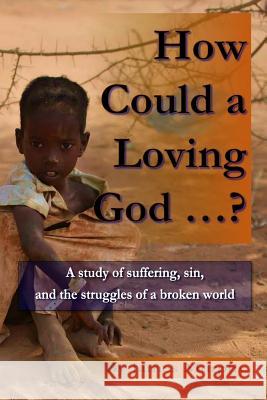How Could a Loving God ...?: A study of suffering, sin, and struggle in a broken world » książka
How Could a Loving God ...?: A study of suffering, sin, and struggle in a broken world
ISBN-13: 9781490902906 / Angielski / Miękka / 2013 / 170 str.
I had the privilege early in my writing career to work with a number of Christian ministries. I found the work both challenging and satisfying, delighted to play some small role in the work of transforming lives that was our common goal. And yet, I would often find myself deeply troubled by what I saw. When confronted with personal disaster - and all disasters are personal for someone - the aware believer must sooner or later ask himself or herself the question, "How could a loving God allow this?" In fact, it is the question the unbelieving world throws in the face of the Church as an excuse to discount our claims. It is an honest and disturbing question. Standing in the midst of a developing-world slum, surrounded by cardboard and corrugated shanties, my nose assaulted by open sewers, body and throat covered with the fine dust of unpaved streets and watching nursing mothers with eyes devoid of hope, I ask myself, "How could a loving God permit this? Does He not hear their cry?" Standing on a now-peaceful coastline littered with the evidence of a killer tsunami, is not my God of love touched by the tragedy of whole villages drowned? Lassoed to a halt by the desperate, pleading gaze of a roomful of Romanian orphans, overwhelmed by the need for love of just one, much less a hundred, does not the heart of my God break? At home in Los Angeles, walking down a skid-row street on a balmy summer night, the only shelter the climate itself, does not my Lord remember having no place to lay his head? How many times, in the midst of doing what little I can, have I cried out in anguish, "God, it's too much How do You stand it? How is it You do not rend the heavens and scatter the stars, reaching out in your awesome power to feed the hungry, heal the sick, comfort the broken and console the lonely? How can You possibly know all things and yet do nothing? How is it that I, being a man of dust with a heart of stone, find myself brought to my knees in tears at the plight of my brothers and sisters while You, who can do all things, remain untouched? Aloof? Unmoved? How do I answer the unbeliever who challenges my assertion that God is love, that He knows all things and can do all things, and has provided a way out of sin by the death of his Son? What do I say when they look around at the world and say, "If this is what your God is like, I want nothing to do with Him"? With what argument do I refute a child dying of diarrhea, who could have been saved by clean water and a few pennies worth of salts? When my own heart is pierced with impotent compassion, how do I shield my God from the accusatory arrows of suffering? For too many years the answer has been, "I don't know. Someday I will. For now, I stand in faith, believing in a God I cannot see and whom I do not understand, but whom I know to be love." Yes, I've heard the arguments about "someday," about sovereignty, about predestination and sin and the arrogance of man to question the will and motivation of his Maker. I've staunchly defended in public while agonizing in private the answer to what, in my opinion, is one of the most troubling questions of our times. For me, the answer to the question, "How could a loving God ...?" has been a key that has opened a new phase in my relationship with a God who, I am now persuaded, in fact loves the world with a love more amazing than ever before. I must warn you, however, the answer to the title question will usher you into a new responsibility as a child of God because we hold the key, and as we discover it in our hand, we are called to use it to unlock a new and powerful revelation of the love of God demonstrated to a hurting and unbelieving world. We have been given a priceless gift and awesome accountability. May the Spirit of God use this simple book written by a broken and unworthy messenger to challenge us all to walk worthy of the high calling of God in Messiah Yeshua.
Zawartość książki może nie spełniać oczekiwań – reklamacje nie obejmują treści, która mogła nie być redakcyjnie ani merytorycznie opracowana.











